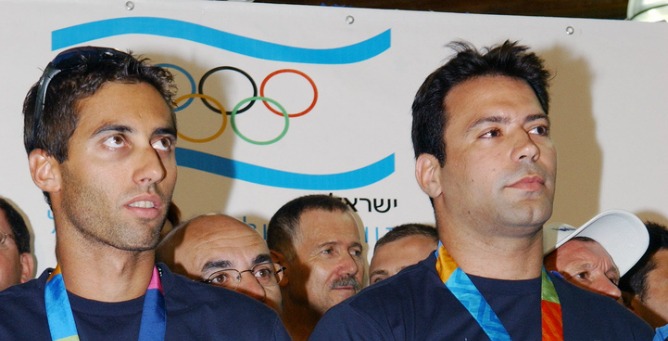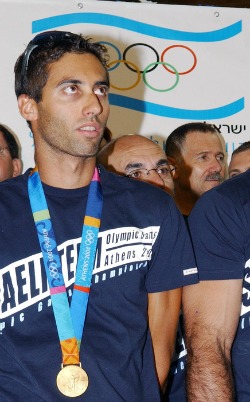Israeli kayaker Michael Kolganov won a bronze medal in Sydney in 2000. This year he’s going for the gold. This week the most promising delegation of athletes in Israel’s Olympic history will stand to the test against representatives from over 200 nations at the 2004 Summer Olympic Games in Athens.
Since Israel began participating in the Olympic games in Helsinki in 1952, its athletes have returned home with a total of four medals: two from Barcelona in 1992, when Yael Arad took a silver and Oren Smadja, a bronze for judo; Gal Friedman’s bronze for windsurfing in Atlanta in 1996; and the bronze awarded Michael Kolganov for kayaking in Sydney in 2000.
Ephraim Zinger, Director-General of the Israeli Olympic Committee, expects Israel to return home from this summer’s Games with at least another two or three Olympic medals.
“We hope this will be the most decorated delegation yet,” Zinger told ISRAEL21c. “This is potentially the best ever Israeli Olympic team.”
Zinger said that although the Athens delegation is four athletes smaller than the 40-member team Israel sent to Sydney, the team this summer is stronger. Israeli competitors will participate in a record number of 14 individual sports – including swimming, synchronized swimming, wrestling, judo, running, windsurfing, pole-vaulting and rhythmic gymnastics.
When asked to name some of the most promising athletes on the roster, Zinger cited three-time European judo champion Arik Ze’evi, who took the silver medal at this year’s world championship; Friedman, who after taking the bronze in Atlanta won the world championships for windsurfing in 2002; Kolganov, who before taking the bronze at Sydney won gold and silver medals for kayaking at the world and European championships in 1999 and 2000; and Alex Averbuch, gold medalist for high jump at the European Championship in Belgium in 2000 and 2002 European pole-vault champ.
According to Frankie Sachs, Sports Editor for The Jerusalem Post, that shortlist can be widened.
“I think there are about eight participants who have real chances at winning a medal,” said Sachs, who added 2003 windsurfing world champion Lee Korsitz; male windsailing duo Udi Gal and Gidi Kilger; female windsailing duo Vered Bouskila and Nike Kornecki; world champion wrestler Gotcha Tsitsiashvili and 2003 world cup gold medalist marksman Guy Starik, to the list of hopefuls.
“There are a ton of athletes on the team who are really at the top of their sport. If they come to the competition focused and healthy, I think Israel could come away with more than the two or three medals they’re hoping for,” said Sachs.
Sachs explains that although many more Israeli athletes qualified for the team by International Olympic Committee standards, this year the Israeli Olympic Committee stuck to the cream of the crop.
“Israel could have doubled the size of its team if they would have let in everyone who qualified by the international standard,” said Sachs, who estimates the team size could have included up to 70 competitors. “But, for the first time Israel created its own selection requirements.
“This year, the Committee has a different objective,” he said. “For a long time, the objective was just to participate, to see and be seen. The team this summer marks the first time that they have really prepared a delegation wherein no one is just coming along for the ride. Everyone on the team has a talent to perform.”
The wealth of talent that has been cultivated among Israel’s athletes is no accident, according to Zinger. He refuted the claim that the team is better because of the participation of new immigrant populations to Israel. Although about half of the athletes on the team were not born in Israel – 16 of the 36 members came to Israel from the Former Soviet Union, as did 12 of the 21 coaches – he says that most of the team learned their skills in Israel.
“I don’t think the team is better because we have athletes from other countries. Most of the Israelis who were born abroad made aliyah when they were teenagers. So, most of them did the bulk of their training here in Israel,” said Zinger.
Sachs concurred with that assessment. “I don’t think the issue is as relevant as it was in the past, when Israel recruited athletes for the team and one to three years after the games, they went back to their countries of origin,” he said. He explained that almost all of the athletes on the current team have been in Israel for most of their adult lives and all of them have been in the country for at least the last four years.
“Most of the athletes will themselves tell you that they are as Israeli as any other Israeli and that they take offense to the suggestion that they are not Israeli or were drafted to Israel for Olympic purposes,” said Sachs.
But according to Kalganov’s kayaking coach Alex Yermilov, who immigrated to Israel from Ukraine in 1991, his country’s origin does have something to do with expertise in training.
“We have a system and knowledge of sports,” Yermilov told the New York Times. “We have experience that has never existed here before, because this is still a young country.”
Sachs suggested the reason why the team is potentially so good is timing – previously promising players are now reaching the heights of their potential.
“Several athletes who showed a lot of potential at Sydney are now at the top of their sport,” he said, using Ze’evi as an example.
“Ze’evi finished in fifth place at Sydney,” explains Sachs. “Since then, he has defended his title as European judo heavyweight champion for the last three years.”
Sachs also anticipated that the Israeli athletes will have an edge over competitors due to the comparable climate in Greece. “They are more familiar with the climactic conditions,” he said. “That factor alone could literally double their chances at winning.”
Interestingly, this year’s Olympic team is comprised of 45% female athletes, an average which Zinger says Israel is especially proud of. “They didn’t make it because they are female, but because they are very good,” he said. “Still, compared to Western delegations, it’s a good number.”
This team also marks the first time that Ethiopia-born Israelis have participated in the Israeli delegation. Marathon runners Haile Satayin and Assaf Bimro, who has already broken the national record and is ranked 20th in the world as a marathon runner, will be competing in track and field events.
The Israeli team will, as it has since the massacre of 11 Israeli athletes by Palestinian terrorists in Munich in 1972, bring its own security team to Athens.
“We are always taking extra measures, in collaboration with the local government which is responsible for the security and safety of athletes from all over the world,” said Zinger. “In a way, Israelis are targets. But, this time it is a little bit different than it used to be. My feeling now is that we are not the only ones.”
From beginning to end, Sachs said his hopes have never been so high. “But, just because it is the most promising team, doesn’t necessarily mean it will have the best results,” he cautioned, saying there is a lot more pressure at the Olympics than at any other sporting event. “But, I am very optimistic. I think this will prove to be the best delegation Israel ever sent to the Olympic Games.”














